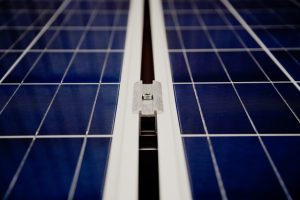
Is your solar panel system ready for winter? Also known as photovoltaic (PV) cells, solar panels offer a clean and renewable source of energy. As sunlight strikes the surface, it will “excite” the stored electrons. Electrons within the solar panels will begin to move, thereby creating an electric current. Solar panels, however, can become less efficient during the winter. By following these 5 winter maintenance tips, you can maximize your panels’ efficiency.
#1) Clean Debris
Debris can affect the efficiency of solar panels. When leaves, dirt and other debris accumulate on them, it will restrict sunlight. Less sunlight will reach the underlying PV cells, resulting in less electricity being produced. Fortunately, most solar panels are easy to clean. Whether you have polycrystalline or monocrystalline solar panels, you should be able to clean them with a soft brush and some water.
#2) Adjust the Angle
For maximum efficiency this winter, you should adjust the angle of your solar panels. If they are too steep or too flat, they will produce less electricity. Solar panels should point at the sun at the most direct angle so that the maximum amount of sunlight strikes their surface. As the seasons change, though, so will the angle of the sun. You can improve your solar panels’ efficiency this winter by adjusting the angle at which they point at the sun.
#3) Check Connections
There’s no better time than late fall or early winter to check your solar panels’ connections. Make sure they don’t have any loose or faulty connections. Loose wires or connectors may interfere with their ability to produce electricity. In some cases, poor connections such as this can be a safety hazard.
#4) Monitor Output
Another winter maintenance tip is to monitor your solar panels’ output. With winter comes shorter days and more frequent cloud coverage, which can lead to lower output levels. Monitoring your solar panels’ output will allow you to identify issues early so that you can fix them. Assuming your system has a monitoring platform or app, keep an eye on its daily production. A sudden and extreme drop in output could be a sign of an underlying problem.
#5) Watch for Ice
Depending on where you live, ice may build up on your solar panels. Ice typically isn’t a problem. Since it’s clear, sunlight will pass through ice to reach the PV cells. But thick or cloudy ice buildup can still lower the efficiency of solar panels. Therefore, you should watch for ice buildup. Consider using a de-icing spray or making your solar panels steeper to minimize ice buildup.
